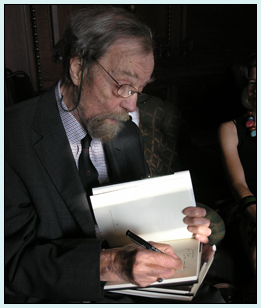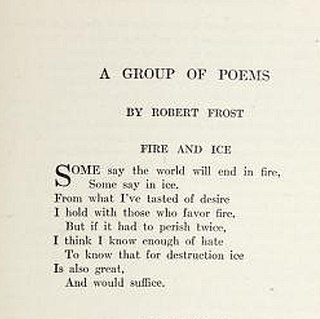Related Research Articles

Robert Lee Frost was an American poet. His work was initially published in England before it was published in the United States. Known for his realistic depictions of rural life and his command of American colloquial speech, Frost frequently wrote about settings from rural life in New England in the early 20th century, using them to examine complex social and philosophical themes.
In poetry, a stanza is a group of lines within a poem, usually set off from others by a blank line or indentation. Stanzas can have regular rhyme and metrical schemes, but they are not required to have either. There are many different forms of stanzas. Some stanzaic forms are simple, such as four-line quatrains. Other forms are more complex, such as the Spenserian stanza. Fixed verse poems, such as sestinas, can be defined by the number and form of their stanzas.

Philip Edward Thomas was a British writer of poetry and prose. He is sometimes considered a war poet, although few of his poems deal directly with his war experiences. He only started writing poetry at the age of 36, but by that time he had already been a prolific critic, biographer, nature writer and travel writer for two decades. In 1915, he enlisted in the British Army to fight in the First World War and was killed in action during the Battle of Arras in 1917, soon after he arrived in France.

Robert Bloomfield was an English labouring-class poet, whose work is appreciated in the context of other self-educated writers, such as Stephen Duck, Mary Collier and John Clare.

Richard Ghormley Eberhart was an American poet who published more than a dozen books of poetry and approximately twenty works in total. "Richard Eberhart emerged out of the 1930s as a modern stylist with romantic sensibilities." He won the Pulitzer Prize for Poetry for Selected Poems, 1930–1965 and the 1977 National Book Award for Poetry for Collected Poems, 1930–1976. He was the grandfather of Pittsburgh Pirates general manager Ben Cherington.

Donald Andrew Hall Jr. was an American poet, writer, editor, and literary critic. He was the author of over 50 books across several genres from children's literature, biography, memoir, essays, and including 22 volumes of verse. Hall was a graduate of Phillips Exeter Academy, Harvard University, and Christ Church, Oxford. Early in his career, he became the first poetry editor of The Paris Review (1953–1961), the quarterly literary journal, and was noted for interviewing poets and other authors on their craft.

"The Road Not Taken" is a narrative poem by Robert Frost, first published in the August 1915 issue of the Atlantic Monthly, and later published as the first poem in the 1916 poetry collection, Mountain Interval. Its central theme is the divergence of paths, both literally and figuratively, although its interpretation is noted for being complex and potentially divergent.
Robert Francis was an American poet who lived most of his life in Amherst, Massachusetts.
George Mann MacBeth was a Scottish poet and novelist.
— Wilfred Owen, concluding lines of "Dulce et Decorum est", written 1917, published posthumously this year
"Stopping by Woods on a Snowy Evening" is a poem by Robert Frost, written in 1922, and published in 1923 in his New Hampshire volume. Imagery, personification, and repetition are prominent in the work. In a letter to Louis Untermeyer, Frost called it "my best bid for remembrance".
Old Man Winter is a personification of winter. The name is a colloquialism for the winter season derived from ancient Greek mythology and Old World pagan beliefs evolving into modern characters in both literature and popular culture. He is usually depicted as an old man, often blowing winter over the landscape with his breath, or simply freezing the landscape with his very presence.

New Hampshire is a 1923 poetry collection by Robert Frost, which won the 1924 Pulitzer Prize for Poetry.
"The Snow Man" is a poem from Wallace Stevens's first book of poetry, Harmonium, first published in the October 1921 issue of the journal Poetry.

"Fire and Ice" is a short poem by Robert Frost that discusses the end of the world, likening the elemental force of fire with the emotion of desire, and ice with hate. It was first published in December 1920 in Harper's Magazine and was later published in Frost's 1923 Pulitzer Prize-winning book New Hampshire. "Fire and Ice" is one of Frost's best-known and most anthologized poems.

Charles Wilbert "Bill" Snow was an American poet, educator and politician. He served as the 75th Governor of Connecticut. He generally went by the name Wilbert or Bill Snow, or formally as C. Wilbert Snow.
"The Death of a Soldier" is a poem from Wallace Stevens's first book of poetry, Harmonium. The poem uses free verse to describe the death of a soldier.
"Futility" is a poem written by Wilfred Owen, one of the most renowned poets of World War I. The poem was written in May 1918 and published as no. 153 in The Complete Poems and Fragments. The poem is well known for its departure from Owen's famous style of including disturbing and graphic images in his work; the poem instead has a more soothing, somewhat light-hearted feel to it in comparison. A previous secretary of the Wilfred Owen Association argues that the bitterness in Owen's other poems "gives place to the pity that characterizes his finest work". "Futility" details an event where a group of soldiers attempts to revive an unconscious soldier by moving him into the warm sunlight on a snowy meadow. However, the "kind old sun" cannot help the soldier – he has died.
"Birches" is a poem by American poet Robert Frost. First published in the August 1915 issue of The Atlantic Monthly together with "The Road Not Taken" and "The Sound of Trees" as "A Group of Poems". It was included in Frost's third collection of poetry Mountain Interval, which was published in 1916.
References
- Tim Kendall (22 February 2007). The Oxford Handbook of British and Irish War Poetry. OUP Oxford. pp. 92–. ISBN 978-0-19-928266-1.